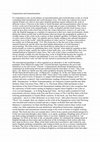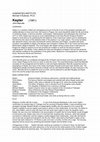Books by Michael O'Sullivan

Routledge, Inc. , 2021
The Economics of Empire: Genealogies of Capital and the Colonial Encounter is a multi-disciplinar... more The Economics of Empire: Genealogies of Capital and the Colonial Encounter is a multi-disciplinary intervention into postcolonial theory that constructs and theorizes a political economy of empire. This project constitutes a critique of postcolonial reason, borrow Spivak’s title, through a collection of analyses that revisit sites of oppression across the globe and across modernity’s longue durée that are well-documented in postcolonial criticism. The aim here however is to trace the underlying financial genealogies associated with the colonial enterprise, the strategies of economic precarity, the pedigrees of capital and the narratives of exploitation that are more readily entertained by today’s econocracy. One of the first attempts to take this approach in postcolonial studies, it seeks to sketch the collusive concomitancy of capital in and with colonialism, reading them as linked trajectories through a merger of an intersectional framework—allying historical and historiographical, economic and class, racial and ethnic, as well as gender and new materialist lenses—together with existing postcolonial and poststructuralist theory.
This collection of essays addresses a key debate in Irish studies. While it is important that res... more This collection of essays addresses a key debate in Irish studies. While it is important that research endeavours to accommodate powerful manifestations of Irishness that are evident today in our globalised economy, these considerations are often overlooked. The writers in this book seek to reconcile the established critical perspectives of Irish studies with a forward-looking critical momentum that incorporates the realities of globalisation and economic migration.

https://penguin.sg/book/lockdown-lovers/, 2021
Lockdown Lovers is a love story set in lockdown conditions across two continents. Pushed to the l... more Lockdown Lovers is a love story set in lockdown conditions across two continents. Pushed to the limits of their endurance in lockdown and then quarantine conditions, John Ryan, a Hong Kong academic, and Phoebe Ho, a Hong Kong District councillor, decide to break the rules of their quarantine and rediscover what has been denied them for too long, passionate human contact. The novel alternates between the perspectives of John, Phoebe, Kwok-ying, a Government Health official, John’s wife Sue, his son Sam, Princess Selina, a millionaire’s heiress, and a pangolin, the mammal reportedly at the root of the virus, as they all find their own way to deal with the dramatic changes in their environments. In Part III John even travels back to Ireland desperate to assist his parents in their lockdown. Haunted by the memory of touch Phoebe opened him up to in quarantine, he realises he must return to Hong Kong to rediscover love with his wife and son. The story ends in Hong Kong in 2022, 2 years after the first appearance of the virus in the city. The novel reminds us of our undying capacities for contact and closeness even at times of pandemic when they seem under threat like never before. https://penguin.sg/book/lockdown-lovers/
CLONELINESS: ON THE REPRODUCTION OF LONELINESS, 2019
CLONELINESS: ON THE REPRODUCTION OF LONELINESS

It is important to note recent debates on transnationalism and world literature as this is a book... more It is important to note recent debates on transnationalism and world literature as this is a book examining both transnational and world literature texts. This book also explores how travel outside Ireland very often to non-native English-speaking regions influences the work of different writers. Criticism in the fields of world literature and transnationalism often focuses on how works travel beyond their regions of origin and on issues of translation. The writers examined in this book write predominantly, if only, in English and this book focuses not so much on how their works travel but on how the writers themselves conceive of, and work with, the English language as a medium of expression in their new expat environments. Justin Quinn has noted recently that world literature often privileges the geographical, political or worldly nature of the works at the expense of their aesthetic qualities; for Quinn, the position of critics such as Emily Apter " too quickly and too finally collapses into national literatures and their views of the world " while the position of critics such as " Casanova universalizes too readily out of Parisian pride " (32). This book tries to flee the nets of the exclusively national framework and the often less than helpful abstractions of world literature's universalising. The Irish writers in this book had no option but to travel and work professionally as writers by publishing their work 'beyond' what might be regarded as their works' point of origin, namely the region of their birth; they were worldly before they were institutionalised as national in many cases. The work of the writers examined here was always already worldly not only because they wrote in English but because the majority, if not all, had to leave Ireland to get published. It was very often only after this worldly appearance that their work was later fed into narratives promoting the national interest.
The image of the university is tarnished: this book examines how recent philosophies of education... more The image of the university is tarnished: this book examines how recent philosophies of education, new readings of its economics, new technologies affecting research and access, and contemporary novelists' representations of university life all describe a global university that has given up on its promise of greater educational equality.

This collection is unique in bringing together key thinkers on language and literature to discuss... more This collection is unique in bringing together key thinkers on language and literature to discuss the future of English in Asia. Many of the contributors are themselves responsible for important sub-genres in English linguistics and literary studies and this collection gives them the opportunity to respond to each other directly. The different chapters also respond to different contemporary debates and emerging trends and discourses that are hugely important for the future of English language teaching in schools across Asia.
This volume is also ground-breaking in bringing English literary studies and Applied English Linguistics together in the contemporary Asian context. The Future of English in Asia includes studies on the following subject areas:
Cultural Translation in World Englishes, Multilingual Education, English Futures and the function of Literature, English Literary Studies in Japan, and English and Social Media in Asia. Well into this century, it appears that it is still very difficult to know what to expect when it comes to the future of English. The future of English will continue to be determined by complex local contexts. As it has in other parts of the world, the future of English in Asia will continue to rely on the proliferation of its transformations as much as its hegemonic status. This volume reflects the widespread acknowledgement that whatever future English has will inevitably be shaped by its fate in Asia.
The collection will be a welcome resource for scholars and students of English linguistics, English literary studies, and topics related to the teaching of English in Asia.
Papers by Michael O'Sullivan
John Banville's Birchwood
John Banville's Birchwood
Humanities Review, 2023
John Banville's Copernicus
Irish Times, 2023
A two tier secondary school system in Ireland: DEIS schools and inequality

Humanities Institute, 2020
Kepler is a carefully crafted and reimagined account of the life of one of the greatest scientist... more Kepler is a carefully crafted and reimagined account of the life of one of the greatest scientists and mathematicians to have ever lived. Set mainly in Prague, the novel beautifully retells the life and times of Johannes Kepler, a German scientist, cosmologist, mathematician and astrologist who lived from 1571 to 1630. Kepler also served as court mathematician to the Holy Roman Emperor Rudolf II. Kepler is most famous for publishing the first defence of the Copernican system and for detailing for the first time the nature of the elliptical orbits of the planets in our solar system. The novel recreates late sixteenth-century and early seventeenth-century Germany and Prague, complete with these societies' susceptibility to plague and disease (two of Kepler's children die in the novel) and their post-Reformation religious disputes. The novel begins with Kepler having to leave Graz in Germany for Prague for religious reasons as he has received an invitation to work for the famous Danish mathematician Tyco Brahe. It then details the trials and tribulations of Kepler's life and the personal and political contexts for the publication of his great works, Mysterium Cosmographicum, Astronomia Nova, Harmonice Mundi and Somnium. LITERARY/HISTORICAL NOTES John Banville gives us a brilliantly reimagined life of Kepler and his times even though Banville had never visited Prague by the time he came to write the novel. The post-Reformation world that Banville recreates for his protagonist and his family is vivid and highly believable. Banville researched all the biographies of Kepler and many of the books that Kepler himself would have been familiar with. The biographical details and family histories of Kepler and his wife Barbara Müller are also explored in the novel. Banville did try to adapt the novel as a film, and he planned to cast Ben Kingsley as Kepler, but in the end the project was never finished. MAIN CHARACTERS Kepler Johannes Kepler, the famous astronomer, scientist and mathematician Tycho Brahe The famous Danish cosmologist and scientist with whom Kepler works with. Barbara Kepler's wife, twice a widower by the age of 22, when she marries Kepler. Jobst Müller The father of Barbara, who is reluctant to let his daughter marry Kepler Regina The daughter of Barbara from a previous marriage Michael Mastlin Kepler's teacher when he was a student at the University of Tubingen Emperor Rudolph King of Bohemia and Holy Roman EmperorBaron Hoffman A nobleman in the Kingdom of Bohemia. General Wallenstein A general at the court of Frederick. Kepler's mother A herbalist and local healer, she ends up being tried as a witch. PLOT Religious Conflict with the in-laws In one of the frequent flashbacks in the novel, Kepler remembers his student days in Tubingen and his courting of Barbara Müller. It was something of an arranged marriage. Barbara Muller is independently wealthy and she expects to live a good life. Kepler's inability to secure regular work leads to strains in their relationship. At one time, his father-inlaw, Jobst Müller, came to stay with them but had never been happy to have his daughter marry Kepler. He was only ever interested in the accumulation of wealth and he knew Kepler would struggle to hold down a job. Kepler was more of a Calvinist than anything else. However, Jobst had already converted to Catholicism and the religious conflict plagued their relationship. Jobst also felt that his son-in-law was arrogant and refused to toe the line. When Jobst learns that Kepler's salary at the school has been reduced to 175 florins a year (not even a month), he flies into a rage. The ensuing argument all but severs any remaining ties between Kepler and his father-in-law. Unhappiness in Graz Kepler had been working as a teacher in a school in Graz. He had been teaching mathematics and even astronomy in the school but the noble parents of the children began to complain about his teaching style. The inspectors of the school also expected that the boys be
Textual Practice, 2013
Ethical criticism often suggests that reading literature can enhance the reader's ‘moral imag... more Ethical criticism often suggests that reading literature can enhance the reader's ‘moral imagination’ and understanding of ‘ethical activity’. However, the connection between enhanced ‘moral imagination’ and ‘ethical activity’ is not always so clear. Adam Phillips and Barbara Taylor have recently argued that ‘real’ kindness has become devalued in society because of the prevalence of what they call ‘sentimental kindness’. This article argues that criticism that privileges literature's value for a ‘moral imagination’ can be read as promoting such sentimental kindness when it comes to describing literature's relevance for ethical activity. The article also reads James Joyce's exploration of kindness in Finnegans Wake as a description of kindness that is closer to the ‘real’ kindness Phillips and Taylor promote.

Springer, 2022
The essay asks how we are to understand the humanities—a field that more than any other must be m... more The essay asks how we are to understand the humanities—a field that more than any other must be mindful of differences—within global university strategies and systems of evaluation that rank universities according to criteria that lead to ever greater homogeneity, strategies that are themselves being challenged today like never before. The continued flourishing of the practice of the intercultural humanities—a practice that Hong Kong universities have long pioneered—requires an openness to the different curricula and practices of the Asian humanities. The challenges to the global university order brought about by the Covid pandemic and the ever more isolationist policies of leading academic players means intercultural humanities programmes are more important than ever for the new generation of university students, especially when international travel is so difficult. The chapter argues that an openness to the Asian humanities on the part of the more established Western humanities programmes offers valuable opportunities for re-centring undergraduate education around the conceptual frames of the intercultural humanities. The chapter focuses on readings of perceived differences between the Eastern and Western traditions of humanities learning, readings that in privileging a spirit of intercultural enquiry also remind us of the challenges that lie ahead for the institutional practice of intercultural humanities.











Uploads
Books by Michael O'Sullivan
This volume is also ground-breaking in bringing English literary studies and Applied English Linguistics together in the contemporary Asian context. The Future of English in Asia includes studies on the following subject areas:
Cultural Translation in World Englishes, Multilingual Education, English Futures and the function of Literature, English Literary Studies in Japan, and English and Social Media in Asia. Well into this century, it appears that it is still very difficult to know what to expect when it comes to the future of English. The future of English will continue to be determined by complex local contexts. As it has in other parts of the world, the future of English in Asia will continue to rely on the proliferation of its transformations as much as its hegemonic status. This volume reflects the widespread acknowledgement that whatever future English has will inevitably be shaped by its fate in Asia.
The collection will be a welcome resource for scholars and students of English linguistics, English literary studies, and topics related to the teaching of English in Asia.
Papers by Michael O'Sullivan
This volume is also ground-breaking in bringing English literary studies and Applied English Linguistics together in the contemporary Asian context. The Future of English in Asia includes studies on the following subject areas:
Cultural Translation in World Englishes, Multilingual Education, English Futures and the function of Literature, English Literary Studies in Japan, and English and Social Media in Asia. Well into this century, it appears that it is still very difficult to know what to expect when it comes to the future of English. The future of English will continue to be determined by complex local contexts. As it has in other parts of the world, the future of English in Asia will continue to rely on the proliferation of its transformations as much as its hegemonic status. This volume reflects the widespread acknowledgement that whatever future English has will inevitably be shaped by its fate in Asia.
The collection will be a welcome resource for scholars and students of English linguistics, English literary studies, and topics related to the teaching of English in Asia.